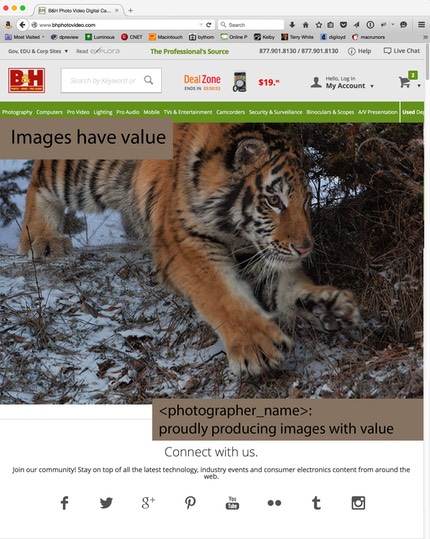I keep hearing the argument that the ubiquitousness of photos has completely devalued them. Sorry, but that's not exactly true. Tell it to Instagram, for instance, who took in over US$20,000,000,000 in revenue from photographs last year (by selling ads alongside them).
To put that in perspective, that's US$20 for every active Instagram user. Did you post to Instagram last year? If so, your photographs were worth at least US$20. Only problem? You didn't get that money, Facebook did (Instagram's owner).
Facebook isn't alone in sucking all the dollars out of your photography's value and putting it in their pocket (about a quarter of which appears to be going into Mark Zuckerberg's pocket, by the way). We've all seen the rights-sucking contests that, once you enter one of your images, the contest company now has the ability to do anything they want with your image (and most of that will involve making money off it). TV stations and news shows want you to send them free photos. So does National Geographic, once a bastion of protecting the value of photography, but after a trip through Fox, somehow took a strong turn towards vulture capitalism.
Despite the fact that it might look like I'm just harping on big companies and rich folk here—I am, but that's not the point—the real culprit is you. "You" as in everyone who takes photos and lets others extract the value from them.
A couple of years ago I had B&H in agreement to let me hijack their landing page (!?!?!). The idea was this: for the first three to five seconds you landed on B&H's site, you'd see a full screen image, as high-quality-as-we-could-make-it image from a professional photographer with a footer that identified the shooter, let you go directly to the shooter's Web site, and had a common marketing slogan and tag about photos having value and why (#photoshavevalue). The goal was to take a stand, and declare to the world that photography is valuable. (From B&H's point of view, if you believe photographs have value, you need the right equipment to make those photographs.)

You probably didn't notice that happening, right?
It didn't happen because while I tried to stir up enough professional photographer support for the idea, most didn't want to take the time or make any additional effort to help me make it happen. Seriously. Of the first 10 pros I approached—you'd know every one of their names—8 basically agreed to the idea over the phone or email but then never followed through in any way.
Which brings me to where the idea originated.
I was sitting at Photoshop World with my teaching assistant at a class that I had encouraged him to sit in on. The class was taught by UK automotive photographer Tim Wallace, and was about how to correctly run your photography business. My aha! moment came when Tim answered someone's question like this: "If you don't value your images, no one else will." Damn right, Tim.
The reason why Tim still makes a good living off of his great imagery is that he works hard to be the best at what he does, produces top notch work, and doesn't discount it when he goes looking for clients. It probably wouldn't surprise you that with that attitude, his clients are very high end: McLaren, Jaguar, Lexus, Land Rover, Aston Martin, Mercedes, and so on. All companies that value their own product ;~).
Images have value. But only if you make them have value. One reason photography-related businesses are failing across the board is that far too many folk are forgetting that.
Ask yourself this: does Canon really value images? Nikon? Sony? Oh, they give lip service to the idea from time to time, but long gone are the days where those companies were truly promoting great imagery first and foremost, images that just happened to be taken with their gear. Try this: go to canon.com or nikonusa.com or sony.com. Any great images blasting you in the face? Nope. As I write this today, on the NikonUSA site there's a big yellow and unavoidable area that wants you to borrow a Z50 for a month, though it's fairly quickly overwritten with an offer to trade in your old camera to get a D780 instead. Lots of dreamy shots of camera bodies and lenses, though. And the D6 brochure? Some of the worst JPEG compression artifacts I've ever seen (look at the sky around the rigging on the shot on page 2: not likely produced by the camera, but rather by the marketing department downsizing things for distribution).
If you make photography all about sumptuous shots of plastic and metal, the specifications, and what the price of that is today, you don't value images. You're a box peddler.
Funny thing is, every iPhone introduction where the camera is featured, it's first and foremost all about the images you can now take (that presumably you couldn't before). Even Apple seems to value images more than Canon, or Nikon, or Sony. Any wonder the smartphone companies are eating the camera company's lunch?
So, the ball is in your court. Are you producing images that have value? Are you doing anything to promote their value? Do you even display them as if they have value? Or are you just worried about how many megapixels you can capture because you know your friend has more?
The road to making photography great again starts with you. Value your images. Value the images produced by others. Stop posting in places that make the money from your image that you didn't. Ask the camera makers to show us more of what their cameras and lenses actually do in the right hands instead of posting a bunch of specs.
Images have value. But only if you make it so.